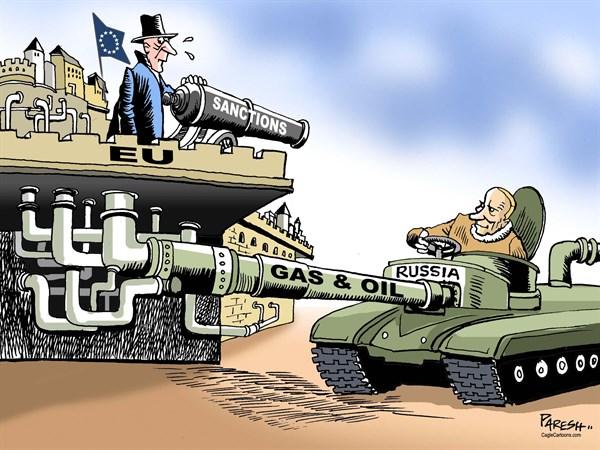
EU & RUSSIA: NO SANCTIONS

For all the tough talk, Europe is unlikely to punish Russia over last week's downing of an airliner over Ukraine beyond speeding up the imposition of already agreed individual sanctions when the bloc's foreign ministers meet on Tuesday.
The severity of future European Union sanctions could depend on the Netherlands, which suffered the greatest loss of life when the Malaysia Airlines flight was brought down.
U.S. President Barack Obama has piled pressure on Europe for a more forceful response, and the three leading EU powers - Britain, France and Germany - said they should be ready to ratchet up sanctions.
But demonstrating the difficulty of getting agreement from 28 member states, London clashed with Paris over France's decision to press ahead with the sale of warships to Russia.
British Prime Minister David Cameron said on Monday such an order had become "unthinkable".
"We need to put the pressure on with all our partners to say that we cannot go on doing business as usual with a country when it is behaving in this way," Cameron said.
He also said the European Union should consider hard-hitting economic sanctions and that Russia could not expect access to European markets, capital and technical expertise.
Diplomats said Tuesday's meeting in Brussels was still not expected to go much further than agreeing on the people and possibly companies to be hit with asset freezes under a more aggressive framework agreed last week. Previously, they had only said they would decide on the list by the end of July.
Several diplomats said moving towards more sweeping economic sanctions could only be decided by heads of government. The attitude of the Netherlands, which lost 193 people in the incident, would be critical, the diplomats said.
"The impulse must come from The Hague because they have the moral mandate to demand a resolute, firm reaction. Everything depends on that," one EU diplomat said on condition of anonymity.
"I think the events will serve to speed up sanctions, but as long as no new European council (of leaders) is called, ministers cannot go further even if they want to," another EU diplomat said.
The next scheduled summit of EU leaders is on Aug. 30, though EU members could call for another emergency meeting.
PROOF?
A summit of EU leaders on July 16, the day before the airliner was shot down, agreed the EU would punish Russian companies that help to destabilize Ukraine and block new loans to Russia.
The wording was deliberately vague as the meeting agreed to target "entities, including from the Russian Federation, that are materially or financially supporting actions undermining or threatening Ukraine's sovereignty".
Adding companies to any sanctions list is more complicated than naming individuals because of the risk of legal challenges.
The United States and its allies have blamed pro-Russian rebels and Moscow itself over the downing of the plane. Russia has denied involvement.
Speaking in parliament on Monday, Dutch Prime Minister Mark Rutte said the EU would impose further sanctions on Russia if it were proved that Russia had been directly or indirectly responsible for bringing the plane down.
Analysts say it could be extremely difficult to prove responsibility for the disaster, which has been viewed as a potential turning point for international pressure to resolve the crisis in Ukraine.
Hundreds have died in a pro-Russian insurgency in eastern Ukraine, which broke out after Russia annexed the Crimea peninsula following the toppling of a Moscow-backed president in Kiev in February by pro-Western protesters.
Britain has said it is ready to pay the price of moving towards a new phase of EU economic sanctions because much bigger costs were at stake.
London is a prime destination for Russian businesses, and Russian oligarchs are major property owners in Britain.
Britain's energy major BP already faces the prospect of fallout following the U.S. decision to sanction Russia's largest oil firm Rosneft, of which BP owns a fifth.
France has said so far it is going ahead with a 1.2 billion euro ($1.6 billion) contract to supply Mistral helicopter carriers to Russia because cancelling the deal would do more damage to Paris than to Moscow. On Monday, a French defense ministry official said any decision on whether to suspend the delivery of the first warship would only take place in October.
ENERGY
EU diplomats made clear sectoral sanctions would be extremely difficult for many EU nations. They are especially nervous about the energy sector, central to the Russian economy, but also to the European Union.
EU nations rely on Russia for about 30 percent of their gas demand and have intertwined interests based on decades of energy reliance. According to U.N. data, excluding Russian pipeline gas exports to the EU - around $60 billion a year - the Netherlands was the biggest destination for Russian exports last year, mostly of oil and metals.
"Energy sanctions would most likely derail the fragile European recovery in general and could even lead to a complete economic collapse in certain member states," one diplomat said. "I don't see how collective economic suicide serves us or the Ukrainians."
While some member states, such as Britain, do not rely on Russian gas, others are 100 percent dependent on Russia, having no other suppliers. In volume terms, Germany and Italy have the biggest exposure.
Diplomats said that if energy had to be part of any sanctions regime, the European Union would have to agree ways to share the financial burden.
($1 = 0.7395 Euros)
reuters.com




